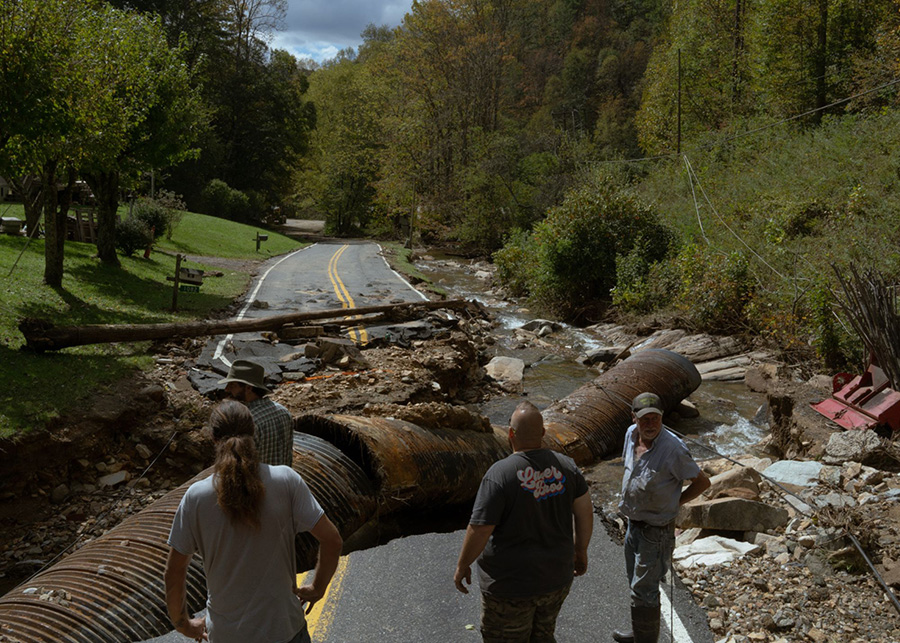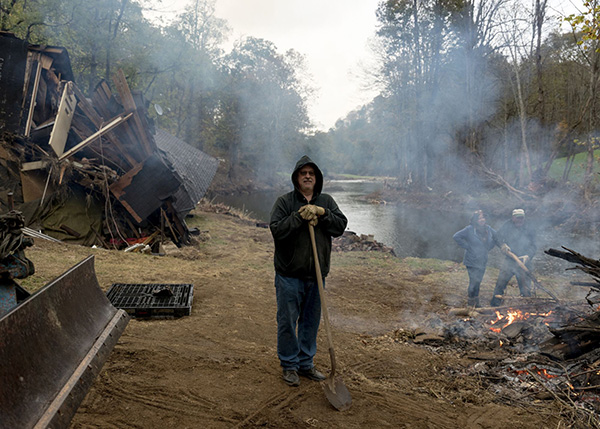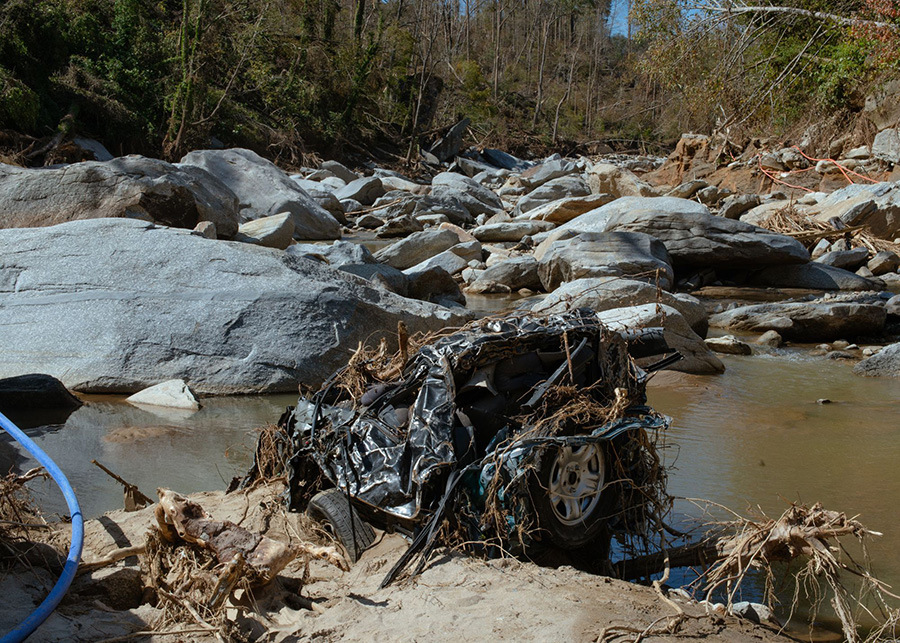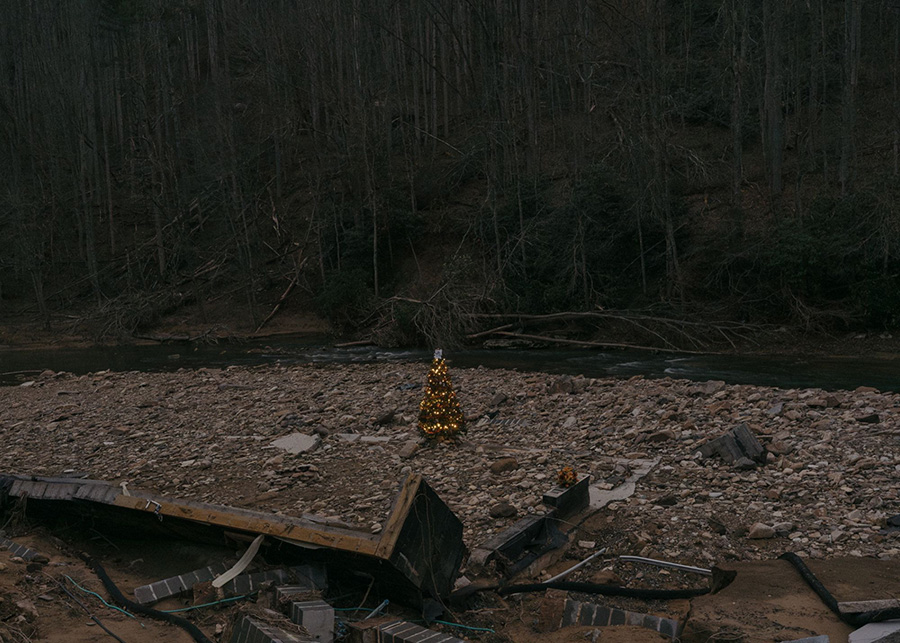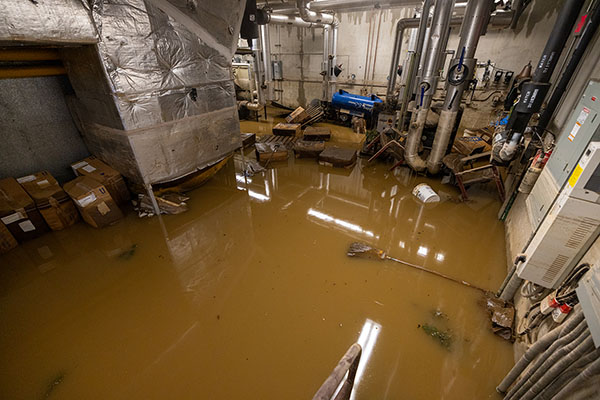
Documentary photographer Jesse Barber ’22 ’24, an alumnus of App State’s Appalachian studies program, is pictured while on assignment at Lake Lure in Rutherford County. While there, Barber met a child who was interested in his camera, and he taught the child how to use it. This photo of Barber was taken by the child. Photo submitted
BOONE, N.C. — Documentary photographer Jesse Barber ’22 ’24, a two-time alumnus of Appalachian State University who completed his master’s degree in Appalachian studies last spring, has played a key role in media efforts to cover the stories of Western North Carolina mountain communities after the devastation caused by Hurricane Helene.
Barber’s photography and writing, as well as an interview on his personal reflections of the weeks following the storm, have been featured in publications that include The New York Times, The Washington Post and Southern Living magazine.
As detailed in a Southern Living piece, Barber drove over 1,000 miles in three days to visit communities across the North Carolina mountains, including Rutherfordton, Swannanoa, Lansing, Marion, North Cove and Rosman. In all of these places, he interacted with community members working to navigate the trauma and destruction caused by Helene. Yet, it was the innumerable stories of strength and resilience that guided Barber’s lens and prompted him to showcase the grassroots efforts to rebuild and sustain regional communities.
“I’m not equipped for ‘bam, bam, here are your destruction shots’ and I’m out,” Barber told Southern Living in an interview. “I’m trying to experience and listen and see the people I’m engaging with. And the sense of place is so important.”
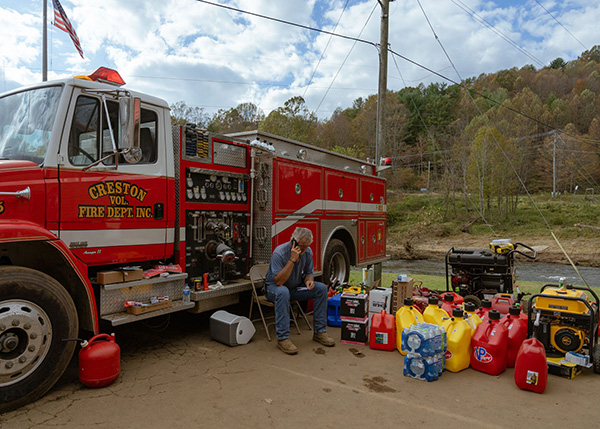
Creston Volunteer Fire Department Chief Junior Seatz is pictured on Oct. 3, 2024, after eight days of answering phone calls, managing supplies, sending crews to communities in need and more. Creston was one of several Western North Carolina communities impacted by Hurricane Helene. Photo by Jesse Barber
In documenting the complex and often overlooked reality of regional communities, Barber acknowledges that his work is deeply personal. During the storm, he experienced the flooding firsthand in the basement of his home prior to venturing out on assignment. Navigating his own experiences, while documenting those of his neighbors in the region, prompted Barber to reshape the stories told by his photography. Ultimately, this led him to document, as he told Southern Living, the experience of “what I was seeing and feeling as a local resident.”
When Barber was a graduate student at App State, he honed his skills as a photographer, filmmaker and oral historian through the South Arts’ “In These Mountains” folklife documentation project, hosted by the Center for Appalachian Studies and in partnership with AppDocs in the Department of Interdisciplinary Studies. Since graduating, he has continued his work at the university through a part-time position with University Libraries, in the Oral History Program through the Special Collections Research Center.
Barber’s Western North Carolina roots in Caldwell County are foundational to his approach to stories about Appalachia, a region whose portrayal in media has historically leaned on stereotypes and narratives of impoverished despair. Transcending these, Barber acknowledges that his work relies on an “understanding of the nuanced perspective in small communities … to expand our understanding of how religion, labor and history intersect with the land today.”
To view more of Barber’s work, visit jesse-barber.com.
What do you think?
Share your feedback on this story.
Special Collections Research Center houses oral histories, university archives, historical exhibits and more
About the College of Arts and Sciences
The College of Arts and Sciences (CAS) at Appalachian State University is home to 17 academic departments, two centers and one residential college. These units span the humanities and the social, mathematical and natural sciences. CAS aims to develop a distinctive identity built upon our university's strengths, traditions and locations. The college’s values lie not only in service to the university and local community, but through inspiring, training, educating and sustaining the development of its students as global citizens. More than 6,800 student majors are enrolled in the college. As the college is also largely responsible for implementing App State’s general education curriculum, it is heavily involved in the education of all students at the university, including those pursuing majors in other colleges. Learn more at https://cas.appstate.edu.
About Appalachian State University
As a premier public institution, Appalachian State University prepares students to lead purposeful lives. App State is one of 17 campuses in the University of North Carolina System, with a national reputation for innovative teaching and opening access to a high-quality, cost-effective education. The university enrolls more than 21,000 students, has a low student-to-faculty ratio and offers more than 150 undergraduate and 80 graduate majors at its Boone and Hickory campuses and through App State Online. Learn more at https://www.appstate.edu.
